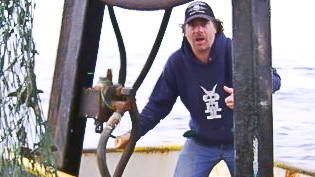Wasting Fish To Save It? Tom Gogola Wins Sidney Award for Exposing Waste in Commercial Fishing

The Sidney Hillman Foundation announced Tuesday that Tom Gogola has won the August Sidney Award for excellence in socially conscious journalism for his story, “Bycatch 22: As a twisted consequence of overfishing regulations, commercial fishermen have no choice but to catch sea bass, flounder, monkfish, and tuna—and throw them dead back into the sea,” which was published in New York Magazine and reported with support from the Investigative Fund of the Nation Institute.
Conservation regulations prohibit fishermen from eating or selling fish caught out-of-season, undersize, or without a permit. The rules are not without internal logic: If fishermen could profit from illegally caught fish, they’d have an incentive to break the law. However, as Gogola witnessed first-hand as a mate on a fish boat, fishermen inevitably catch some forbidden species, which must be discarded, even though they’re perfectly good to eat.
Gogola writes:
While concerned consumers fret over which fish are correct to order at their favorite seafood restaurant, heading to websites maintained by groups such as the Environmental Defense Fund for guidance on the “eco-best” and “eco-worst” fish to purchase, the truth about commercial fishing in the United States is that a regulatory framework designed to limit overfishing results in vast numbers of fish per year being scooped up on boats and dumped right back off, dead, never consumed by any human. Concerned about “endangered” bluefin tuna? Tell it to the tuna long-liners who’ve had to cut loose untold numbers of dead bluefins in recent years, owing to the restrictions that come with winding up on the endangered-species list.
Around the world, hundreds of millions of tons of edible fish are simply thrown overboard like garbage.
Gogola talks to one commercial fisherman who is campaigning to change the rules to allow fishers to donate their bycatch to local VA hospitals and charities in exchange for a tax write-off. He also describes some innovative government-funded research to reduce bycatch by improving fishing technology.
Read my interview with Gogola here. We talk about his work on a fishing boat, the ins and outs of sustainable seafood, and how the Investigative Fund of the Nation Institute helped make this story possible.
[Photo credit: Tom Gogola on the reporting/fishing trip that formed the basis for his story, by Don Ball. Courtesy of Tom Gogola.]





